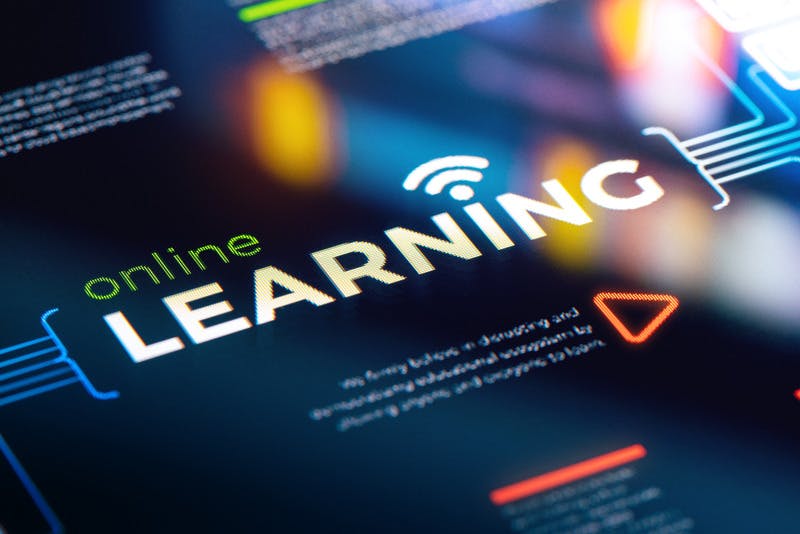

In today’s fast-paced digital world, the concept of education has evolved significantly, giving rise to the phenomenon of online courses. But what is an online course? Simply put, an online course is a comprehensive learning program conducted in a virtual space, accessible from anywhere with an internet connection.
These courses have revolutionized the traditional educational landscape, offering a flexible and diverse learning experience that caters to a wide range of learning goals.

Online courses vary greatly in format and purpose. From short bursts of skill-based learning to in-depth degree programs, these courses are designed to suit various learning experiences. They can be fully online, blending online and face-to-face elements, or somewhere in between. This flexibility allows learners to complete courses at their own pace and on their own terms.
Most online courses are divided into units or modules, each focusing on specific topics or skills. These can include a variety of course materials like pre-recorded and live lectures, interactive webinars, discussion forums, and hands-on projects. Such a structure makes it easy for students to digest information in manageable chunks.

A key component of online education is the Learning Management System (LMS). This powerful tool hosts and manages course content, streamlines enrollment processes, and keeps track of students’ progress. It’s the engine behind the smooth operation of an online course.
Choosing the right Learning Management System (LMS) is crucial for students embarking on online courses, as well as for course creators aiming to deliver effective and engaging content. While there are many LMS platforms available, Teach.io stands out for its unique features and benefits. Here’s an overview of the key features to look for in an LMS, with a focus on how Teach.io excels in these areas.
The #1 to make money online with TikTok Search (FREE TRAINING)

Teach.io fosters a vibrant and supportive community for both course creators and students, creating a dynamic learning ecosystem. For course creators, it offers a collaborative space where they can share best practices, access valuable resources, and receive feedback from peers, enhancing their teaching methodologies.
Students, on the other hand, benefit from an engaging and interactive community where they can connect with fellow learners, participate in discussions, and seek support. This communal aspect of Teach.io enhances the overall learning experience, encouraging both academic growth and the building of meaningful connections in the digital education landscape.
One of the greatest advantages of online courses is their accessibility. Whether on a mobile device or a desktop, students can access learning materials at any time, making it ideal for those juggling work, education, and personal commitments.
This self-paced nature of online learning means that you can learn in the comfort of your home or while on the move, maintaining the continuity of your education regardless of your physical location.

Live courses offer real-time interaction with the course instructor and other participants. These live lectures and discussions create a dynamic learning environment, closely resembling traditional classroom settings.
In drip courses, content is released in phases or at scheduled intervals. This approach keeps students engaged over a longer period and helps in absorbing information in short bursts.
Self-paced courses offer ultimate flexibility. Students can access and complete lessonsand assessments as per their schedules, making it a popular choice for professional development and personal growth.

In an online course, the instructor plays a crucial role. They not only create and deliver content but also facilitate discussions, provide feedback, and assist students in achieving their learning goals. The interaction between students and instructors in the online format is vital for an enriching learning experience.
Participants in online courses are not just passive receivers of information. They actively engage with the material, communicate with peers, and contribute to discussion forums, enriching the learning experience for everyone involved.
The creation of an online course offers a multitude of possibilities and opportunities for industry experts to share their knowledge and expertise. By leveraging the power of video content, these professionals can construct comprehensive and engaging educational experiences.
This method of content delivery, while initially time-consuming to set up, can become a significant source of passive income. Once the course is live, people from all over the world can enroll, providing a broad and diverse audience for the expert’s insights.
Moreover, this platform allows for continual updates and revisions, enabling the expert to incorporate the latest research and developments in their field, thereby keeping the course content fresh and relevant.
This dynamic process not only benefits learners but also allows the expert to stay actively engaged with their subject matter and audience.

Online courses have revolutionized the way students acquire knowledge, offering a flexible and diverse learning environment. These courses allow students to interact with instructors and peers in various ways, adapt to different learning styles, and pursue various accreditations, including degree programs.
In online classes, students interact with instructors primarily through digital platforms. This interaction can take the form of video conferences, email exchanges, discussion forums, and real-time chat sessions.
Instructors typically provide feedback on assignments, answer queries, and facilitate discussions. Peer interaction often occurs in discussion forums, group projects, and peer review assignments, enabling students to learn collaboratively and build a network.

Online courses often employ a variety of learning materials, ranging from video lectures and e-books to interactive simulations. This diverse array of materials caters to different learning styles, ensuring that the course content is accessible and engaging. Students may also have access to online libraries and databases to supplement their learning.
Many online courses offer certifications or credits toward a degree program. These programs are often accredited by educational authorities, ensuring that they meet specific quality standards.
Accredited programs are particularly important for students who wish to use their online coursework for professional advancement or further education.
Online courses offer a flexible, diverse learning environment, catering to a broad target audience. From the way students interact with instructors and peers to the type of accreditations available, online education provides numerous opportunities for personal and professional growth.
Whether enrolled in a similar course for skill enhancement or a full-fledged degree program, e-learning has something to offer for every learner.
The #1 to make money online with TikTok Search (FREE TRAINING)

The most significant advantage of online courses is their convenience. Learners can study at their own pace and own time, fitting their education around other life commitments. This flexibility makes learning more accessible to a wider audience.
Online courses cover an extensive range of subjects, from academic topics to practical skills and personal hobbies. This variety means that there’s a course for almost every interest and professional need.
Online learning connects students from around the world, creating a diverse learning community. This global network offers unique perspectives and networking opportunities.

While online courses offer numerous benefits, they come with their own set of challenges. Staying motivated in a self-paced environment, managing time effectively, and the lack of physical interaction can be difficult for some learners. However, with the right approach and mindset, these challenges can be overcome.
The world of online education is continuously evolving. With advancements in technology and instructional design, online courses are becoming more sophisticated and interactive. They are a viable alternative to traditional education, offering flexibility, accessibility, and a diverse range of learning opportunities.
As we embrace this digital revolution in education, it’s clear that online courses will continue to play a significant role in lifelong learning and professional development. They offer a unique opportunity for individuals to learn new skills, advance their careers, and explore new interests, all on their own terms.

In conclusion, online courses represent a significant shift in the educational landscape, offering unprecedented flexibility, accessibility, and personalization in learning. The traditional boundaries of classrooms have been expanded, if not entirely dissolved, by the digital revolution, enabling learners worldwide to access a vast array of knowledge and skills at their convenience. This shift has not only democratized education but also tailored it to fit the needs and lifestyles of modern learners.
The future of learning through online courses is bright and full of potential. With advancements in technology, we are witnessing a continual enhancement in the quality and interactivity of online education.
Virtual reality, artificial intelligence, and adaptive learning algorithms are just some of the innovations that are beginning to play a role in online learning, promising even more immersive and personalized educational experiences. The integration of these technologies is not just a possibility but an inevitability in the evolution of online education.
In essence, online courses have put the future of learning into the hands of the learners themselves. They have opened up a world where education is no longer confined by geographical, financial, or temporal barriers. As we continue to embrace and improve this mode of learning, we move closer to a world where anyone, anywhere, can learn anything at any time – a truly revolutionary notion.





